Letters from Arthur Seaforth Blackburn to his family, 1941 - Part 6
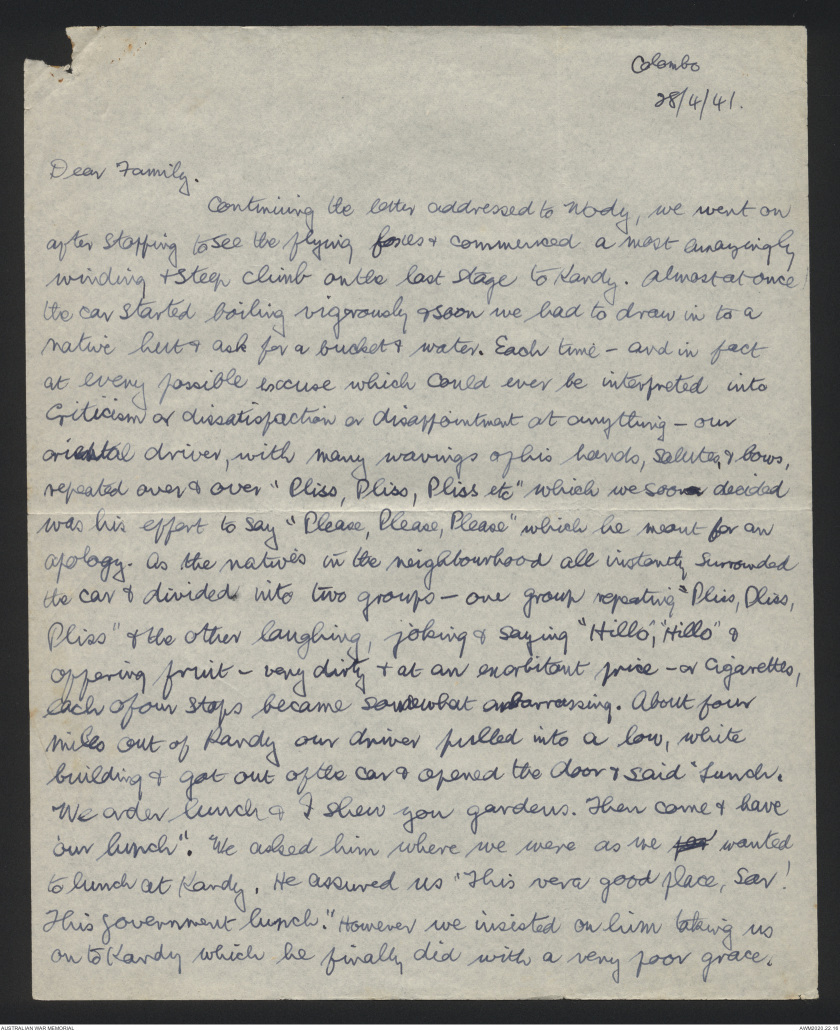
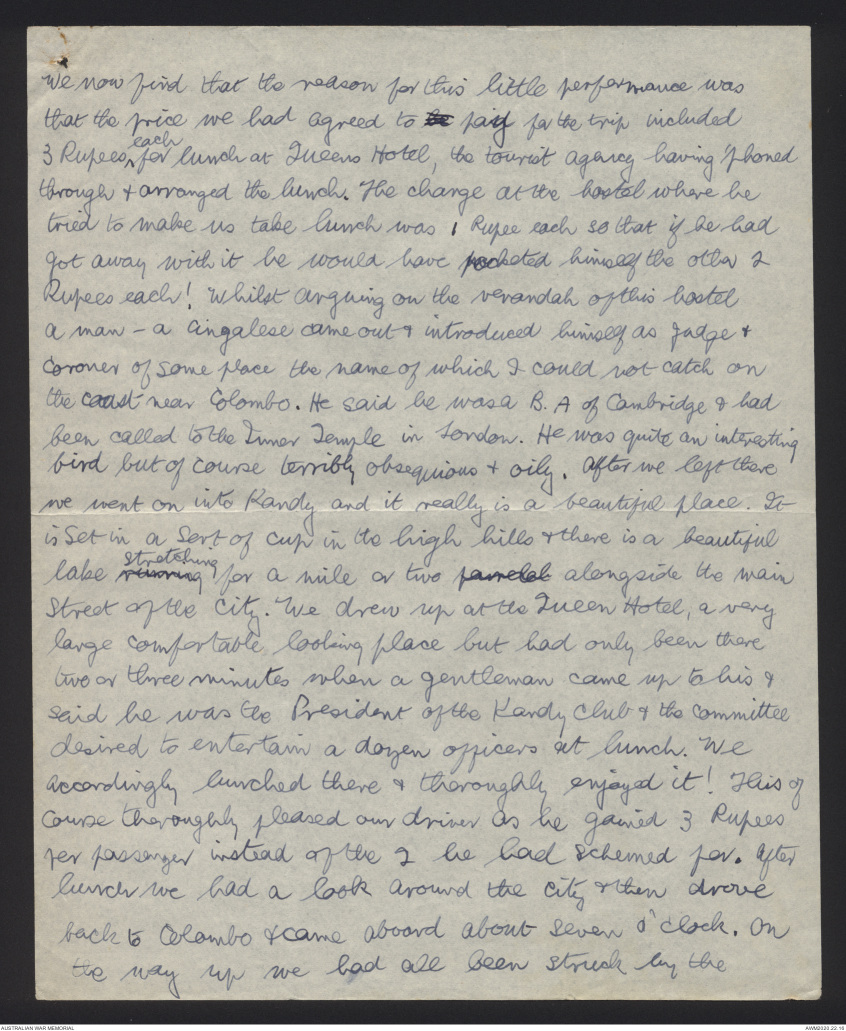
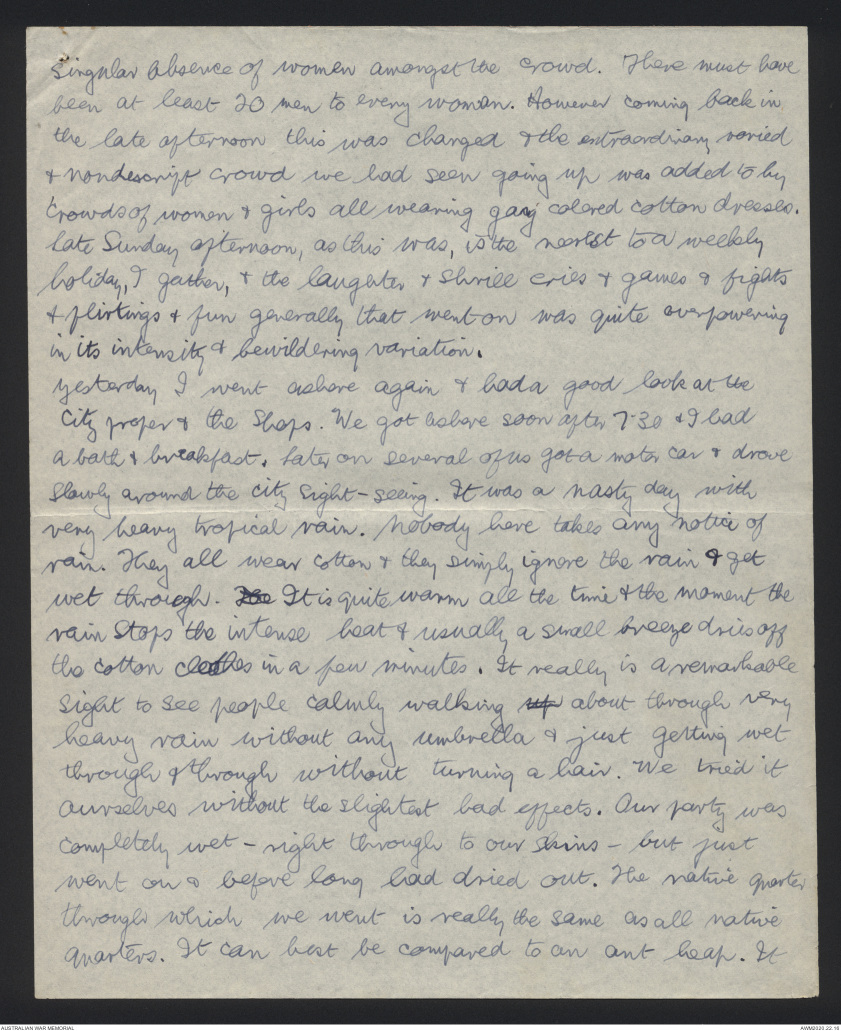
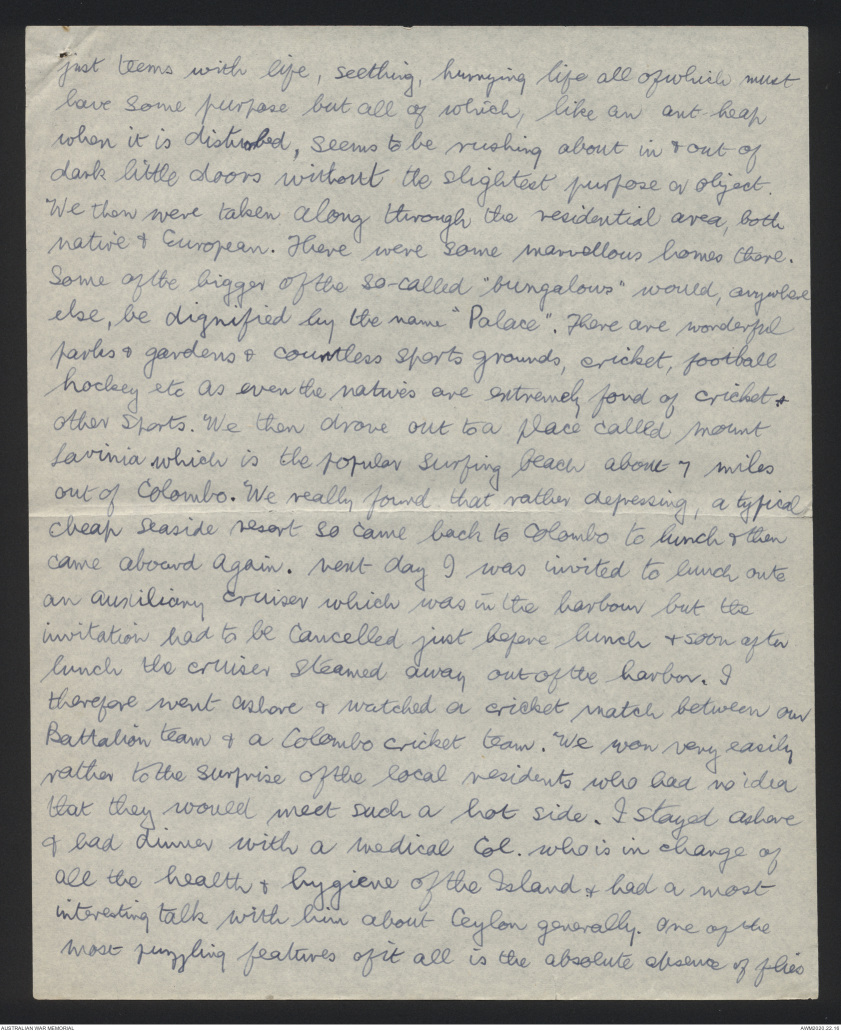
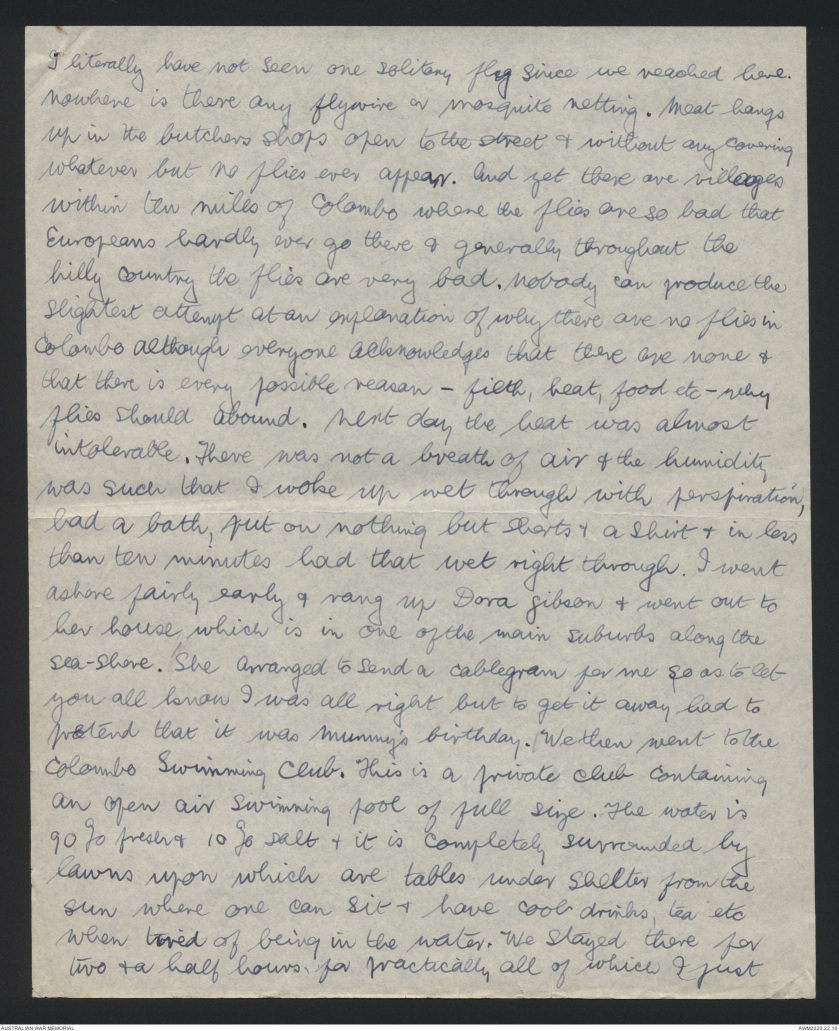
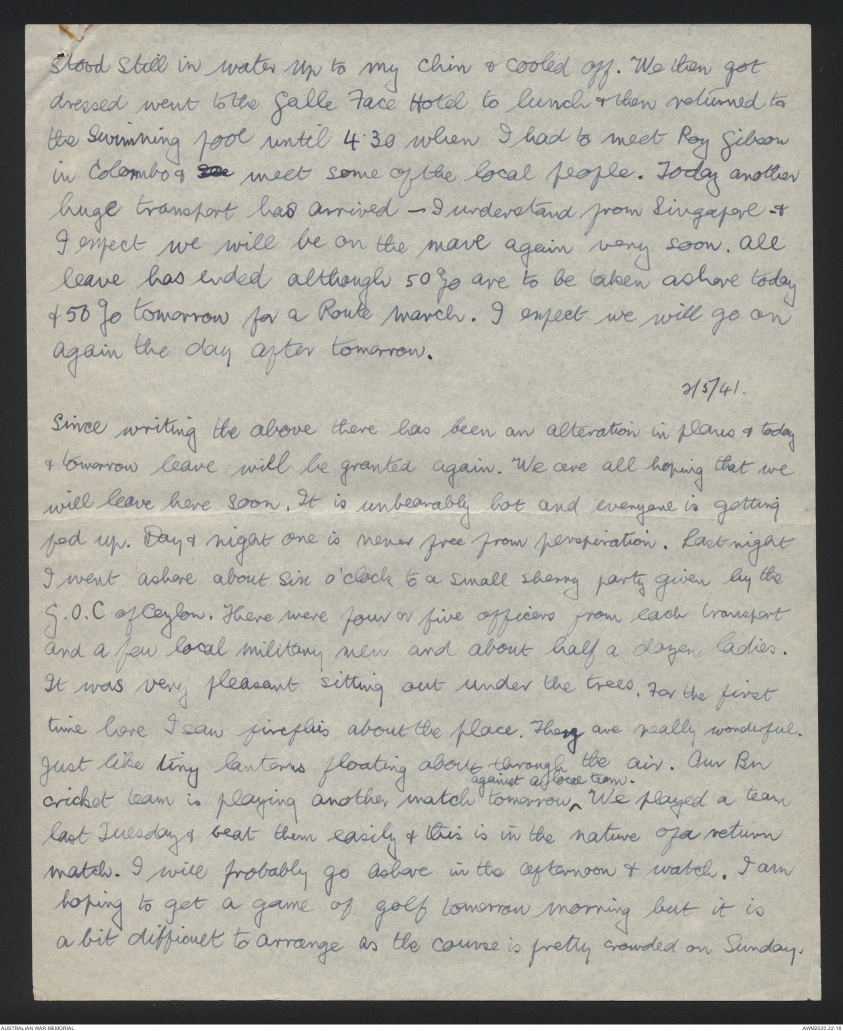
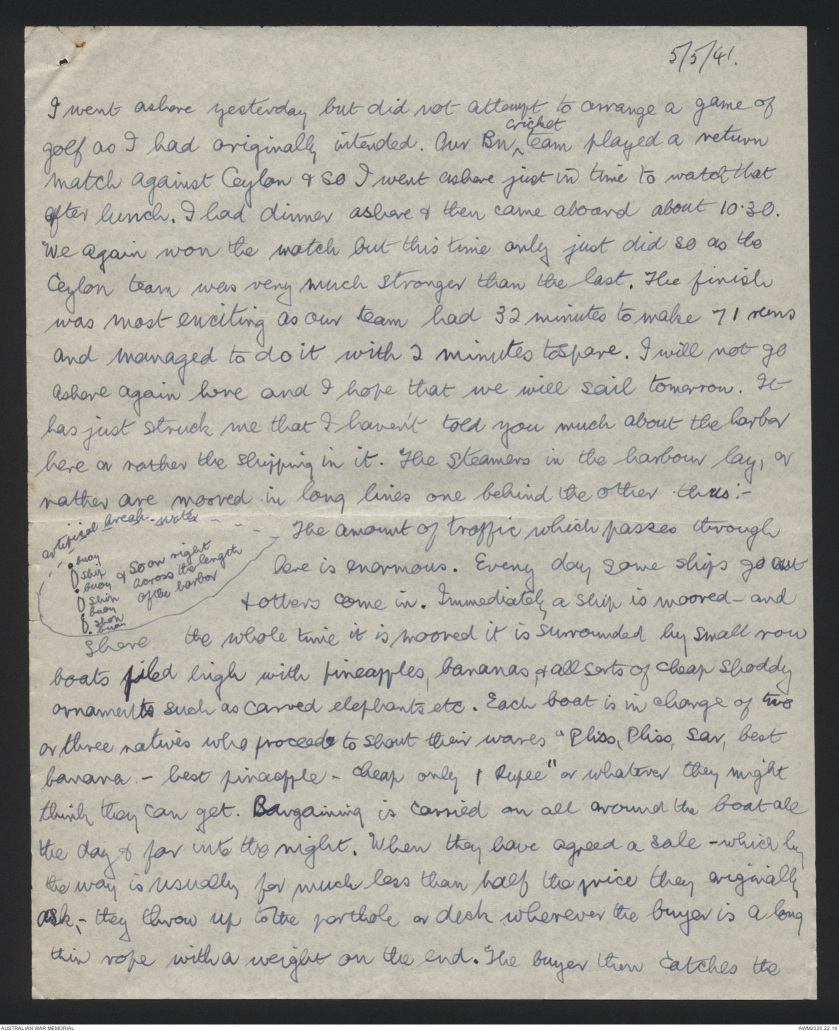
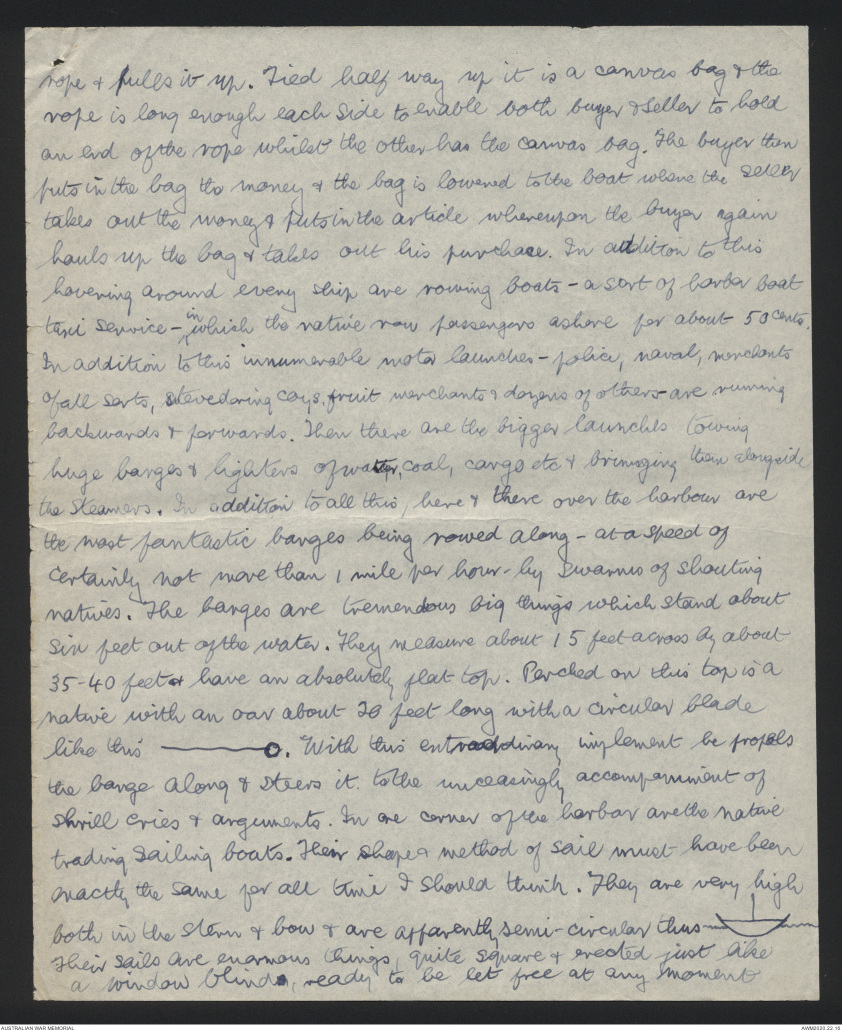
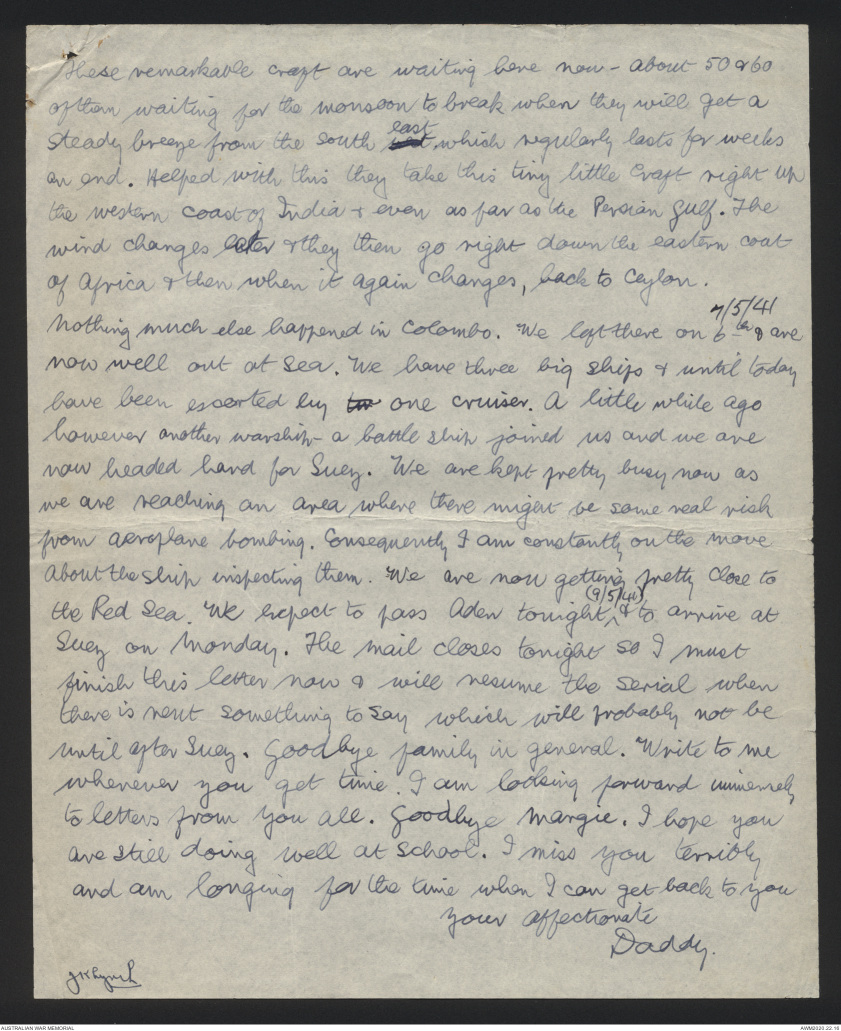
Colombo
28/4/41.
Dear Family
Continuing the letter addressed to Wody, we went on
after stopping to see the flying foxes & commenced a most amazingly
winding & steep climb on the last stage to Kandy. Almost at once
the car started boiling vigorously & soon we had to draw in to a
native hut & ask for a bucket & water. Each time - and in fact
at every possible excuse which could ever be interpreted into
criticism or dissatisfaction or disappointment at anything - our
oriental driver, with many wavings of his hands, salutes, & bows,
repeated over & over "Pliss, Pliss, Pliss etc" which we soon decided
was his effort to say "Please, Please, Please" which he meant for an
apology. As the natives in the neighbourhood all instantly surrounded
the car & divided into two groups - one group repeating "Pliss, Pliss,
Pliss" & the other laughing, joking & saying "Hillo", "Hillo" &
offering fruit - very dirty & at an exorbitant price - or cigarettes,
each of our stops became somewhat embarrassing. About four
miles out of Kandy our driver pulled into a low, white
building & got out of the car & opened the door & said "Lunch.
We order lunch & I shew you gardens. Then come & have
our lunch". We asked him where we were as we per wanted
to lunch at Kandy. He assured us "This vera good place, Sar!
This government lunch." However we insisted on him taking us
on to Kandy which he finally did with a very poor grace.
We now find that the reason for this little performance was
that the price we had agreed to be pay for the trip included
3 Rupees each for lunch at Queens Hotel, the tourist agency having 'phoned
through & arranged the lunch. The charge at the hostel where he
tried to make us take lunch was 1 Rupee each so that if he had
got away with it he would have pocketed himself the other 2
Rupees each! Whilst arguing on the verandah of this hostel
a man - a Angalese came out & introduced himself as Judge &
Coroner of some place the name of which I could not catch on
the coast near Colombo. He said he was a B.A of Cambridge & had
been called to the Inner Temple in London. He was quite an interesting
bird but of course terribly obsequious & oily. After we left there
we went on into Kandy and it really is a beautiful place. It
is set in a sort of cup in the high hills & there is a beautiful
lake running stretching for a mile or two parrelel alongside the main
street of the city. We drew up at the Queen Hotel, a very
large comfortable looking place but had only been there
two or three minutes when a gentleman came up to his &
said he was the President of the Kandy Club & the committee
desired to entertain a dozen officers at lunch. We
accordingly lunched there & thoroughly enjoyed it! This of
course thoroughly pleased our driver as he gained 3 Rupees
per passenger instead of the 2 he had schemed for. After
lunch we had a look around the city & then drove
back to Colombo & came aboard about seven o'clock. On
the way up we had all been struck by the
singular absence of women amongst the crowd. There must have
been at least 20 men to every woman. However coming back in
the late afternoon this was changed & the extraordinary varied
& nondescript crowd we had seen going up was added to by
crowds of women & girls all wearing gay colored cotton dresses.
Late Sunday afternoon, as this was, is the nearest to a weekly
holiday, I gather, & the laughter & shrill cries & games & fights
& flirtings & fun generally that went on was quite overpowering
in its intensity & bewildering variation.
Yesterday I went ashore again & had a good look at the
City proper & the Shops. We got ashore soon after 7.30 & I had
a bath & breakfast. Later on several of us got a motor car & drove
slowly around the city sight-seeing. It was a nasty day with
very heavy tropical rain. Nobody here takes any notice of
rain. They all wear cotton & they simply ignore the rain & get
wet through. The It is quite warm all the time & the moment the
rain stops the intense heat & usually a small breeze dries off
the cotton clothes in a few minutes. It really is a remarkable
sight to see people calmly walking up about through very
heavy rain without any umbrella & just getting wet
through & through without turning a hair. We tried it
ourselves without the slightest bad effects. Our party was
completely wet - right through to our skins - but just
went on & before long had dried out. The native quarter
through which we went is really the same as all native
quarters. It can best be compared to an ant heap. It
just teems with life, seething, hurrying life all of which must
have some purpose but all of which, like an ant heap
when it is disturbed, seems to be rushing about in & out of
dark little doors without the slightest purpose or object.
We then were taken along through the residential area, both
native & European. There were some marvellous homes there.
Some of the bigger of the so-called "bungalows" would, anywhere
else, be dignified by the name "Palace". There are wonderful
parks & gardens & countless sports grounds, cricket, football
hockey etc as even the natives are extremely fond of cricket &
other sports. We then drove out to a place called Mount
Lavinia which is the popular surfing beach about 7 miles
out of Colombo. We really found that rather depressing, a typical
cheap seaside resort so came back to Colombo to lunch & then
came aboard again. Next day I was invited to lunch onto
an auxiliary cruiser which was in the harbour but the
invitation had to be cancelled just before lunch & soon after
lunch the cruiser steamed away out of the harbor. I
therefore went ashore & watched a cricket match between our
Battalion team & a Colombo cricket team. We won very easily
rather to the surprise of the local residents who had no idea
that they would meet such a hot side. I stayed ashore
& had dinner with a medical Col. who is in charge of
all the health & hygiene of the Island & had a most
interesting talk with him about Ceylon generally. One of the
most puzzling features of it all is the absolute absence of flies
I literally have not seen one solitary fly since we reached here.
Nowhere is there any flywire or mosquito netting. Meat hangs
up in the butchers shops open to the street & without any covering
whatever but no flies ever appear. And yet there are villages
within ten miles of Colombo where the flies are so bad that
Europeans hardly ever go there & generally throughout the
hilly country the flies are very bad. Nobody can produce the
slightest attempt at an explanation of why there are no flies in
Colombo although everyone acknowledges that there are none &
that there is every possible reason - filth, heat, food etc - why
flies should abound. Next day the heat was almost
intolerable. There was not a breath of air & the humidity
was such that I woke up wet through with perspiration,
had a bath, put on nothing but shorts & a shirt & in less
than ten minutes had that wet right through. I went
ashore fairly early & rang up Dora Gibson & went out to
her house which is in one of the main suburbs along the
sea-shore. She arranged to send a cablegram for me so as to let
you all know I was all right but to get it away had to
pretend that it was Mummy's birthday. We then went to the
Colombo Swimming Club. This is a private club containing
an open air swimming pool of full size. The water is
90% fresh & 10% salt & it is completely surrounded by
lawns upon which are tables under shelter from the
sun where one can sit & have cool drinks, tea etc
when tired of being in the water. We stayed there for
two & a half hours, for practically all of which I just
stood still in water up to my chin & cooled off. We then got
dressed went to the Galle Face Hotel to lunch & then returned to
the swimming pool until 4.30 when I had to meet Roy Gibson
in Colombo & see meet some of the local people. Today another
huge transport has arrived - I understand from Singapore &
I expect we will be on the move again very soon. All
leave has ended although 50% are to be taken ashore today
& 50% tomorrow for a Route march. I expect we will go on
again the day after tomorrow.
2/5/41.
Since writing the above there has been an alteration in plans & today
& tomorrow leave will be granted again. We are all hoping that we
will leave here soon. It is unbearably hot and everyone is getting
fed up. Day & night one is never free from perspiration. Last night
I went ashore about six o'clock to a small sherry party given by the
G.O.C of Ceylon. There were four or five officers from each transport
and a few local military men and about half a dozen ladies.
It was very pleasant sitting out under the trees. For the first
time here I saw fireflies about the place. They are really wonderful.
Just like tiny lanterns floating about through the air. Our Bn
cricket team is playing another match tomorrow against a local team. We played a team
last Tuesday & beat them easily & this is in the nature of a return
match. I will probably go ashore in the afternoon & watch. I am
hoping to get a game of golf tomorrow morning but it is
a bit difficult to arrange as the course is pretty crowded on Sunday.
5/5/41.
I went ashore yesterday but did not attempt to arrange a game of
golf as I had originally intended. Our Bn cricket team played a return
match against Ceylon & so I went ashore just in time to watch that
after lunch. I had dinner ashore & then came aboard about 10.30.
We again won the match but this time only just did so as the
Ceylon team was very much stronger than the last. The finish
was most exciting as our team had 32 minutes to make 71 runs
and managed to do it with 2 minutes to spare. I will not go
ashore again here and I hope that we will sail tomorrow. It
has just struck me that I haven't told you much about the harbor
here or rather the shipping in it. The steamers in the harbour lay, or
rather are moored in long lines one behind the other thus:-
The amount of traffic which passes through
here is enormous. Every day some ships go out
& others come in. Immediately a ship is moored - and
the whole time it is moored it is surrounded by small row
boats piled high with pineapples, bananas, & all sorts of cheap shoddy
ornaments such as carved elephants etc. Each boat is in charge of two
or three natives who proceed to shout their wares "Pliss, Pliss, Sar, best
banana - best pineapple - cheap only 1 Rupee" or whatever they might
think they can get. Bargaining is carried on all around the boat all
the day & far into the night. When they have agreed a sale - which by
the way is usually for much less than half the price they originally
ask, - they throw up to the porthole or deck wherever the buyer is a long
thin rope with a weight on the end. The buyer then catches the
rope & pulls it up. Tied half way up it is a canvas bag & the
rope is long enough each side to enable both buyer & seller to hold
an end of the rope whilst the other has the canvas bag. The buyer then
puts in the bag the money & the bag is lowered to the boat where the seller
takes out the money & puts in the article whereupon the buyer again
hauls up the bag & takes out his purchase. In addition to this
hovering around every ship are rowing boats - a sort of harbor boat
taxi service - in which the native row passengers ashore for about 50 cents.
In addition to this innumerable motor launches - police, naval, merchants
of all sorts, stevedoring coys, fruit merchants & dozens of others- are running
backwards & forwards. Then there are the bigger launches towing
huge barges & lighters of water, coal, cargo etc & bringing them alongside
the steamers. In addition to all this, here & there over the harbour are
the most fantastic barges being rowed along - at a speed of
certainly not more than 1 mile per hour - by swarms of shouting
natives. The barges are tremendous big things which stand about
six feet out of the water. They measure about 15 feet across by about
35 - 40 feet & have an absolutely flat top. Perched on this top is a
native with an oar about 20 feet long with a circular blade
like this. With this extraordinary implement he propels
the barge along & steers it to the unceasingly accompaniment of
shrill cries & arguments. In one corner of the harbor are the native
trading sailing boats. Their shape & method of sail must have been
exactly the same for all time I should think. They are very high
both in the stern & bow & are apparently semi-circular thus
Their sails are enormous things, quite square & erected just like
a window blind, ready to be let free at any moment
These remarkable craft are waiting here now - about 50 or 60
of them waiting for the monsoon to break when they will get a
steady breeze from the south west east which regularly lasts for weeks
on end. Helped with this they take this tiny little craft right up
the western coast of India & even as far as the Persian Gulf. The
wind changes later & they then go right down the eastern coat
of Africa & then when it again changes, back to Ceylon.
7/5/41
Nothing much else happened in Colombo. We left there on 6th & are
now well out at sea. We have three big ships & until today
have been escorted by tw one cruiser. A little while ago
however another warship - a battle ship joined us and we are
now headed hard for Suez. We are kept pretty busy now as
we are reaching an area where there might be some real risk
from aeroplane bombing. Consequently I am constantly on the move
about the ship inspecting them. We are now getting pretty close to
the Red Sea. We expect to pass Aden tonight (9/5/41) & to arrive at
Suez on Monday. The mail closes tonight so I must
finish this letter now & will resume the serial when
there is next something to say which will probably not be
until after Suez. Goodbye family in general. Write to me
whenever you get time. I am looking forward immensely
to letters from you all. Goodbye Margie. I hope you
are still doing well at school. I miss you terribly
and am longing for the time when I can get back to you
your affectionate
Daddy.
JK Lynch
 Jacqueline Kennedy
Jacqueline KennedyThis transcription item is now locked to you for editing. To release the lock either Save your changes or Cancel.
This lock will be automatically released after 60 minutes of inactivity.